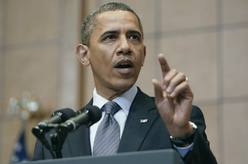US leads call to end global hunger, malnutrition
Leaders of the world's industrial powers Friday turned to the private sector to help fight hunger and malnutrition for up to a billion people, with US President Barack Obama announcing a new public-private partnership programme involving some $3 billion in corporate pledges.

Striving to spur G8 summit of the worlds wealthy nations, Obama said, "Some have asked in a time of austerity whether this new alliance is just a way for government to shift the burden onto somebody else. I want to be clear. The answer is no."
Addressing an audience of several hundred, including rock singer Bono, a leading voice in the call to end global hunger, Obama assured, "Even in these tough fiscal times, we will continue to make historic investments in development."
The new plan calls upon about 45 private businesses and organizations, nearly half of them in Africa, to invest more than $3 bilion in agricultural projects and programmes that will help millions of farmers.
The proposed initiatives include partnership with agribusiness giants such as DuPont, Monsanto and Cargill, along with smaller companies
Officials say the plan, if realized, could raise 50 million people out of poverty over the next 10 years.
This year's meeting of the G8 - the United States, Britain, Germany, France, Italy, Japan, Canada and Russia - will focus on some of the major global worries including Greece, the future of the euro zone and proposals to tap emergency oil reserves to offset diminishing exports from sanctions-hit Iran.
But U.S. officials say the Obama administration also wants the G8 to take fresh steps to improve global food security, building on its 2009 summit in L'Aquila, Italy, which sought to mobilize $20 billion over three years to boost agricultural investments in poor countries.
"Reducing malnutrition and hunger around the world advances international peace and security, and that includes the national security of the United States," said Obama, highlighting domestic concerns during a U.S. presidential election year.
Global food prices soared in 2008, which led to increased hunger, malnutrition and social unrest, highlighting the years of underinvestment in agriculture in developing countries.
Food prices have remained high and volatile since, rising by 40 percent between June and December 2010 alone, while maize and wheat prices doubled during that period, raising the food bills of the world's poor countries.
Source: US News.Net
- 439 reads
Human Rights
Fostering a More Humane World: The 28th Eurasian Economic Summi

Conscience, Hope, and Action: Keys to Global Peace and Sustainability

Ringing FOWPAL’s Peace Bell for the World:Nobel Peace Prize Laureates’ Visions and Actions

Protecting the World’s Cultural Diversity for a Sustainable Future

Puppet Show I International Friendship Day 2020

